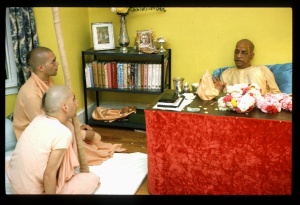SB 5.4.15: Difference between revisions
m (1 revision(s)) |
(Vanibot #0054 edit - transform synonyms into clickable links, which search similar occurrences) |
||
| (One intermediate revision by one other user not shown) | |||
| Line 1: | Line 1: | ||
{{info | {{info | ||
|speaker= | |speaker=Śukadeva Gosvāmī | ||
|listener=King | |listener=King Parīkṣit | ||
}} | }} | ||
[[Category:Srimad-Bhagavatam - Canto 05 Chapter 04]] | |||
[[Category:Bhagavatam Verses Spoken by Sukadeva Gosvami - Vanisource|050415]] | |||
<div style="float:left">'''[[Srimad-Bhagavatam]] - [[SB 5|Fifth Canto]] - [[SB 5.4: The Characteristics of Rsabhadeva, the Supreme Personality of Godhead|Chapter 4: The Characteristics of Ṛṣabhadeva, the Supreme Personality of Godhead]]'''</div> | |||
<div style="float:right">[[File:Go-previous.png|link=SB 5.4.14]] '''[[SB 5.4.14]] - [[SB 5.4.16]]''' [[File:Go-next.png|link=SB 5.4.16]]</div> | |||
{{RandomImage}} | |||
==== TEXT 15 ==== | ==== TEXT 15 ==== | ||
<div class="verse"> | |||
<div | :yad yac chīrṣaṇyācaritaṁ tat tad anuvartate lokaḥ | ||
yad yac chīrṣaṇyācaritaṁ tat tad anuvartate lokaḥ | |||
</div> | </div> | ||
| Line 14: | Line 19: | ||
==== SYNONYMS ==== | ==== SYNONYMS ==== | ||
<div class="synonyms"> | |||
<div | ''[//vanipedia.org/wiki/Special:VaniSearch?s=yat&tab=syno_o&ds=1 yat] [//vanipedia.org/wiki/Special:VaniSearch?s=yat&tab=syno_o&ds=1 yat]'' — whatever; ''[//vanipedia.org/wiki/Special:VaniSearch?s=śīrṣaṇya&tab=syno_o&ds=1 śīrṣaṇya]'' — by the leading personalities; ''[//vanipedia.org/wiki/Special:VaniSearch?s=ācaritam&tab=syno_o&ds=1 ācaritam]'' — performed; ''[//vanipedia.org/wiki/Special:VaniSearch?s=tat&tab=syno_o&ds=1 tat] [//vanipedia.org/wiki/Special:VaniSearch?s=tat&tab=syno_o&ds=1 tat]'' — that; ''[//vanipedia.org/wiki/Special:VaniSearch?s=anuvartate&tab=syno_o&ds=1 anuvartate]'' — follow; ''[//vanipedia.org/wiki/Special:VaniSearch?s=lokaḥ&tab=syno_o&ds=1 lokaḥ]'' — the people in general. | ||
yat | |||
</div> | </div> | ||
| Line 22: | Line 26: | ||
==== TRANSLATION ==== | ==== TRANSLATION ==== | ||
<div class="translation"> | |||
<div | |||
Whatever action is performed by a great man, common men follow. | Whatever action is performed by a great man, common men follow. | ||
</div> | </div> | ||
| Line 29: | Line 32: | ||
==== PURPORT ==== | ==== PURPORT ==== | ||
<div class="purport"> | |||
A similar verse is also found in ''Bhagavad-gītā'' ([[BG 3.21 (1972)|BG 3.21]]). It is essential for human society to have a section of men perfectly trained as qualified brāhmaṇas according to the instructions of Vedic knowledge. Those below the ''brahminical'' qualification—administrators, merchants and workers—should take instructions from those ideal people who are considered to be intellectuals. In this way, everyone can be elevated to the highest transcendental position and be freed from material attachment. The material world is described by Lord Kṛṣṇa Himself as ''duḥkhālayam aśāśvatam'' ([[BG 8.15 (1972)|BG 8.15]]), a temporary place of misery. No one can stay here, even if he makes a compromise with misery. One has to give up this body and accept another, which may not even be a human body. As soon as one gets a material body, he becomes ''deha-bhṛt'', or ''dehī''. In other words, he is subjected to all the material conditions. The leaders of society must be so ideal that by following them one can be relieved from the clutches of material existence. | |||
</div> | |||
<div | <div style="float:right; clear:both;">[[File:Go-previous.png|link=SB 5.4.14]] '''[[SB 5.4.14]] - [[SB 5.4.16]]''' [[File:Go-next.png|link=SB 5.4.16]]</div> | ||
__NOTOC__ | |||
</div> | __NOEDITSECTION__ | ||
__NOTOC__ | |||
Latest revision as of 22:18, 18 February 2024

A.C. Bhaktivedanta Swami Prabhupada
TEXT 15
- yad yac chīrṣaṇyācaritaṁ tat tad anuvartate lokaḥ
SYNONYMS
yat yat — whatever; śīrṣaṇya — by the leading personalities; ācaritam — performed; tat tat — that; anuvartate — follow; lokaḥ — the people in general.
TRANSLATION
Whatever action is performed by a great man, common men follow.
PURPORT
A similar verse is also found in Bhagavad-gītā (BG 3.21). It is essential for human society to have a section of men perfectly trained as qualified brāhmaṇas according to the instructions of Vedic knowledge. Those below the brahminical qualification—administrators, merchants and workers—should take instructions from those ideal people who are considered to be intellectuals. In this way, everyone can be elevated to the highest transcendental position and be freed from material attachment. The material world is described by Lord Kṛṣṇa Himself as duḥkhālayam aśāśvatam (BG 8.15), a temporary place of misery. No one can stay here, even if he makes a compromise with misery. One has to give up this body and accept another, which may not even be a human body. As soon as one gets a material body, he becomes deha-bhṛt, or dehī. In other words, he is subjected to all the material conditions. The leaders of society must be so ideal that by following them one can be relieved from the clutches of material existence.